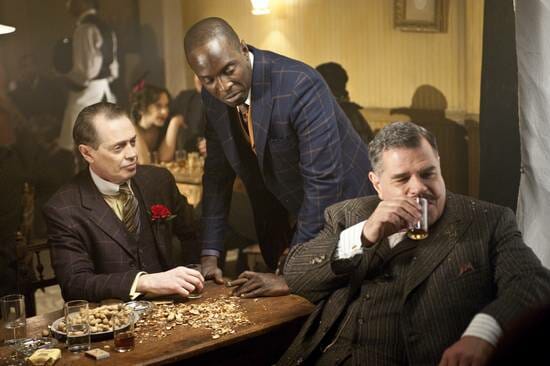The show’s first episode was famously directed by Martin Scorsese, and audience expectations were that it would bring out the Scorsese of Goodfellas or The Departed, fast-paced gangster thrillers where there’s some real dynamism to accompany the weighty material. There’s a bit of that there, but it was mostly the Scorsese of The Aviator or Last Temptation of Christ who showed up. Boardwalk Empire has remained tempered ever since. Thanks to The Sopranos, the show’s audience expects an eventual pay off, but fundamentally this is a very different kind of show.
“Home” was a typical episode, which isn’t to disparage its quality. A fairly lengthy early scene features an old man slowly collapsing to the ground. It’s just the man and, although his collapse has large effects five minutes later, it’s still a strange scene and is fairly demanding of its viewers in that there’s no real reason for them to care what’s going on beyond the show’s implicit confirmation that this will be linked up. He was, of course, the Thompson brothers’ father and his collapse means that his old house is now vacant. Wanting to do something with the space, Nucky offers it for free to one of his associates but is unable to full cast it aside, later on visiting the location with Margaret. The home is essential to our understanding of Nucky and his childhood, with the episode’s focus being on his horrible upbringing and what it means for his current profession. This plotline also brings Margaret and Nucky closer and it’s readily apparent why he dumped his previous concubine for her: He wants to have a family, and by paying for Margaret, he’s effectively paying for the rights to her children as well. It’s both sweet and sinister, much like the man himself.
Then there’s Chalky White, who suddenly seems poised to become central to the show’s action. New York gangsters offer him money to bootleg directly for him but, assuming that they’re in fact hired by Nucky, he turns them down. We hear nothing from Chalky again until one small encounter thirty minutes later, where he tries to call Nucky on his bluff but Nucky has no idea what he’s talking about. It’s a small plotline that has little to do with the episode at hand but promises to be big for the rest of the season. Likewise, the New Yorkers are teaming up with locals who also hate Nucky in a plot that’s at this point mostly just foreshadowing.
Finally there’s Jimmy and Chicago, which has frequently been my least favorite part of the show. What exactly any of Jimmy’s business over there has to do with Atlantic City is yet to become clear, not to mention that Jimmy himself is a pretty unlikeable character (and I’m only partially biased because of Michael Pitt’s role in Haneke’s painful Funny Games re-make). Here, though, his plot was nearly as interesting as Nucky’s, and the two were a sort of thematic pair in trying to explain these two characters. Jimmy left New Jersey partially because he felt that without war experience Nucky didn’t understand him while Al would. When Al turned out to be lying about this, not to mention rather nuts, he’s gone searching for help elsewhere and has now met the former sniper Richard Harrow, who shares his wartime experience and also an injury sustained during battle. Once again, disabilities are central to the storytelling in Chicago. Richard’s partial blindness and, more than anything, his mask seem to signal him as a sociopath, unable to fully see the world and only showing a mask of himself to Jimmy so far. He’s an intriguing mystery and his shot from the window was timed perfectly, delivering a scene orchestrated so well it’s almost worth rewinding just to admire the editing.
By the episode’s end, both Nucky and Jimmy have effectively destroyed the past after putting up a façade of moving on without violence and the relationship between the two is darkened a bit despite them seeing nothing of one another. Nucky’s past trouble with father figures seems to signal his difficulty with Jimmy (and unfortunately also with Margaret’s children) while Jimmy and his sniper seem even further detached from the world of Atlantic City. I can’t say it’s my favorite episode thus far. Even with its violent ending, it’s more about building depth in its characters and setting things in motion for the rest of the season. It’s not a crowd-pleaser but it was a valuable piece of the season’s puzzle, which is fitting for a show where what happens on the side is just as important as the set-pieces. “Home” ended with both a murder and a fire but I suspect its most important moment was the thirty seconds where Nucky and Chalky spoke—in Atlantic City the slow burn seems to always be more important than the conflagration.
Stray Observations:
• Yes, Jimmy does have a screw loose. Maybe it’s not subtle, but I appreciate the observation, random doctor.
• One of the writers of the episode was Paul Simms, the genius behind Newsradio. As much as I love the guy, though, he seems like a pretty weird choice for the writing staff.
• I rather enjoyed that Nucky’s dad treats the toaster the way my dad treats computers.
• The poster in the background of the hospital reads NOW Veneral Diseases! after explaining how we’ve gotten rid of other things. It’s just odd to see venereal diseases put so prominently. We should’ve put that poster in my high school.
• Enoch was part of the Junior Beach Patrol. I like to imagine little Buscemi wandering around doing that.
• Nucky’s germ rhyme is batshit insane. Yes, I realize it’s probably appropriate for the show’s period.
• The whole Jeckyll/Hyde metaphor seems a bit too on the head. Hell, that would be too on the head for a drama on NBC. That was disappointing.
